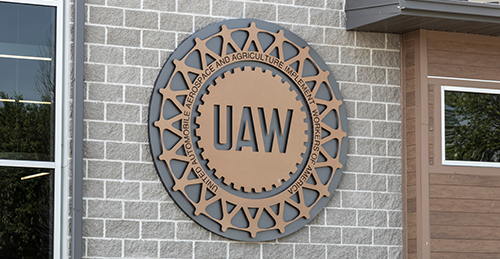 With less than a month to go before the Big Three and the UAW labor contracts expire (September 14), the UAW is ratcheting up its negotiation rhetoric and posturing.
With less than a month to go before the Big Three and the UAW labor contracts expire (September 14), the UAW is ratcheting up its negotiation rhetoric and posturing.
Two weeks ago, the new UAW President Shawn Fain, put out a video of him throwing the Stellantis contract proposal in a waste basket and calling it “insulting” (whoa). Last week the UAW called for a vote to authorize a strike and Fain has been quoted as saying this may be a strike against all three auto manufacturers rather than one as has been done in the recent past. This being said, Fain also stated the UAW may use a variety of strike tactics at its disposal.
The UAW contracts with the Big Three cover over 150,000 auto workers. The expiring contract was negotiated back in 2019. This time around, the UAW is looking to gain a lot.
As reported from various sources, the UAW wants:
-
- A 40% pay raise over the life of the contract.
- An end to two-tier wages and benefits.
- Reinstatement of Cost-of-Living Adjustments (COLA).
- Further job security and guarantees as the auto industry transitions into electric vehicles.
- The right to strike over plant closures and pay for workers left behind for community service work they would perform.
The strike authorization vote by UAW members is scheduled to be completed by August 24th. Strike authorization just gives the UAW permission from its membership to call a strike should they deem it necessary. It does not mean they will strike at this point.
In addition to a blanket strike against all three Autos, the strike(s) may take the form of work stoppages at certain key plants or just a single plant (at one or all three autos).
The UAW strike fund is about $825 million. Workers on strike would receive $500 per week of strike pay. A blanket strike by all UAW auto workers could exhaust the strike fund in just 12 weeks. This is something the UAW must keep in mind as it ratchets up its strike rhetoric. A strike of just six weeks would cost workers an estimated $1 billion in pay. This estimate is based on existing hourly pay of $30 – $40/hour per worker.
Though a strike is an expensive proposition for the UAW, it is worse for the automakers. The 2019 strike against GM cost the company an estimated $3.6 billion. It lasted 40 days. The Detroit Free Press estimated a prolonged strike today could cost them over $11 billion.
There are other concerned parties to these negotiations. Auto suppliers would be impacted by a strike, and they will also be impacted by any new contract. The UAW typically uses the Big Three contract to set the foundation for the auto suppliers that have UAW contracts.
So, there is a lot on the line as parties enter the last month of the contract. Last week Shawn Fain reported that the talks have been “too slow” as he called for the strike authorization vote by his membership.
ASE will follow the 2023 Auto Talks and report on developments as they progress.
Sources: The Hill 5 Things to Know About a Possible UAW Strike (8/15/2023)
Detroit Free Press. UAW Contract Talks Grow Tense, But No One Wins with a Prolonged Strike – Opinion (8/16//2023)
Law360 Employment Authority. Big Three Face Big Demands as UAW Members Vote on Strike (8/16/2023)